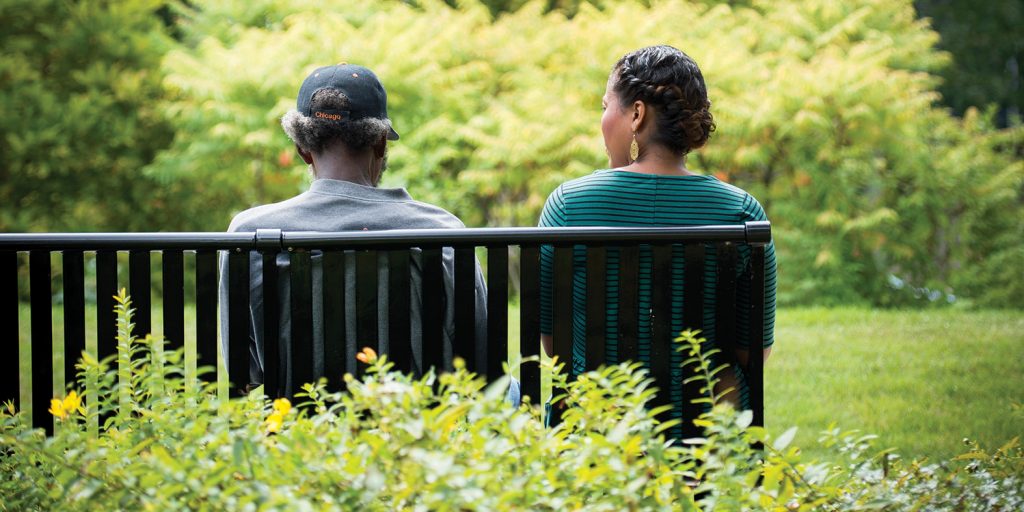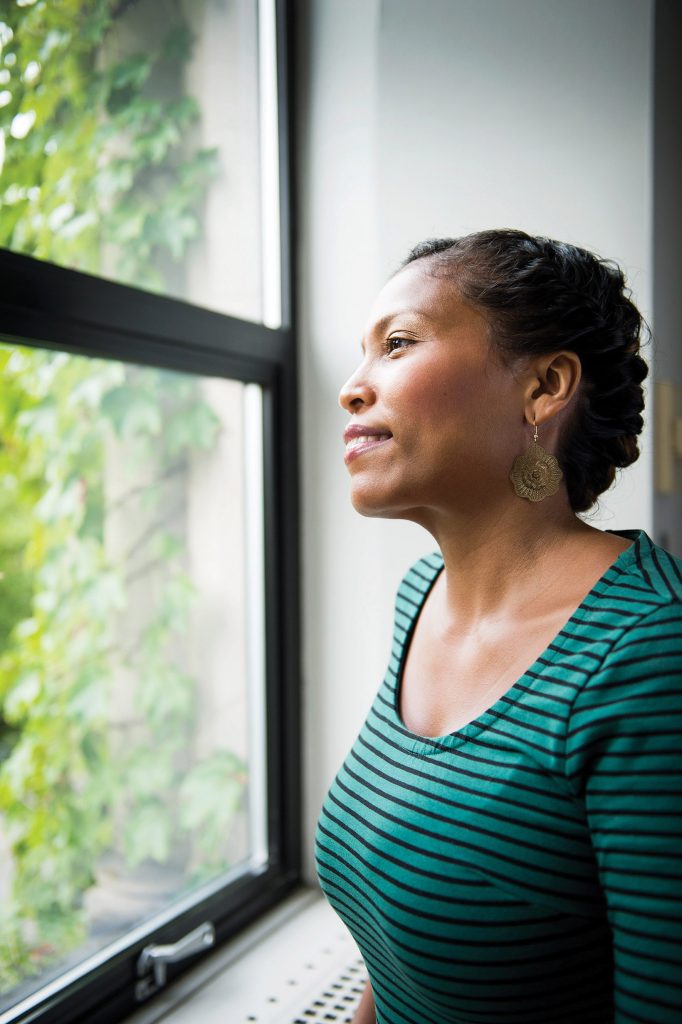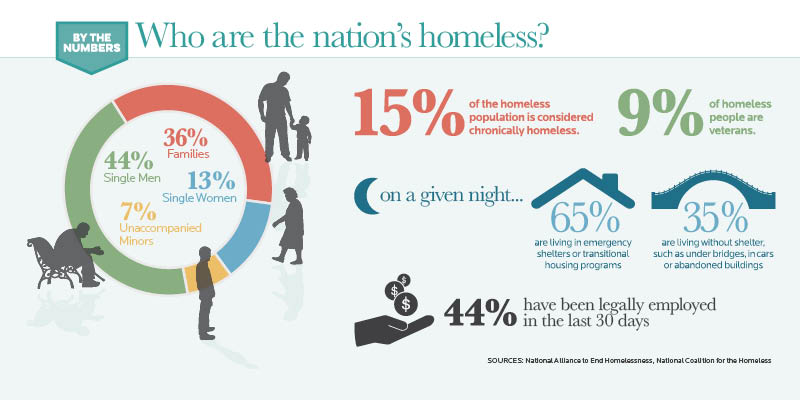
Desire Bernard first did a project on Chicago homelessness as a Mittie, Moselynne and Dempsey Travis scholar. As an honors student, she was paired with a nonprofit professional who taught her more about the homelessness issue and how it can be best addressed. Now the Roosevelt senior is applying all she’s learned to help a homeless man named Larry Roby reclaim his dignity.
Ignoring the man who sleeps outside her office window atop a heating grate in Chicago’s Midway Plaisance Park has never been an option for Roosevelt University senior Desire Bernard.
The 35-year-old psychology major, whose motto in life is “We can figure it out,” comes from a tradition of giving. “My mother was always feeding somebody,” said the Belize native who came to the United States at age 11 and was awarded U.S. citizenship last year. “In that regard, I’m following in her footsteps.”
The honors student will be the first in her family to receive a college diploma when she graduates from Roosevelt in the spring of 2016. Her odyssey of learning about and understanding the plight of Chicago’s homeless began as a new Roosevelt student in fall 2013.
“Desire’s philosophy in life is to help others and do justice. She’s the real deal in terms of living those values,” said Laura Evans, a Roosevelt professor of organizational leadership and mentor to Bernard, who enrolled at the University because of its mission.
An office manager at the Urban Education Institute in Chicago’s Hyde Park, Bernard first saw movement under a blanket in Midway Plaisance Park as she looked out her window in early October 2013. She realized a man lived there when she saw him a few days later sitting on a plastic cooler next to the blanket.
After two weeks of watching and with the weather turning colder, Bernard decided to carry down a cup of coffee. The whir of a boiler fan shooting hot air up through the heating grate could be heard as Bernard offered the coffee and the man nodded in thanks.
“When she discovered this man living on a heating grate, it was only natural for her to befriend him,” said Evans, who taught a critical reasoning and skills course that Bernard took as a freshman. “She’s been doing one-on-one social justice with him ever since, though it’s probably been a tougher road than she expected.”
“What I’ve learned is that America has the resources in place to help, but it lacks the community.”
Desire Bernard
Bernard certainly has experienced plenty of ups and downs during the past two years as she has come to know and understand Larry Roby, the 60-year-old homeless man whose life has been full of frustration.
“When people find out you don’t have anything, they have a tendency to turn their noses up,” Roby said recently. “They don’t know the situation, even though they think they do.”
The experience also has been a career builder for Bernard, who has done considerable legwork contacting caseworkers, free medical clinics and homeless housing advocates, among others, to assist her in helping Roby.
“This is not someone who shrinks from challenges,” said Megan Bernard (not related to Desire Bernard), associate provost for inclusion/enrichment and a director of Roosevelt’s new Community Mentoring Program, which paired the honors student with a leader of a Chicago not-for-profit homeless-care provider. “The knowledge she’s getting in the classroom and the know-how she’s gaining in the field are preparing her to be a leader capable of making contributions to positive change in communities.”
There wasn’t much conversation at first, as Desire didn’t want to be too pushy, but she thought a lot about the man on the heating grate, visiting him twice a week with food, clothing, drug-store sundries and other essentials.
By January 2014, Bernard had learned Roby’s story, interviewing him for her 2013-14 Mittie, Moselynne and Dempsey Travis scholarship project at Roosevelt – a video she titled “The Invisible Ones,” which was well received at its screening.
“What was nice about the project is the way she approached the topic of homelessness,” said Joan Berg, a Travis family foundation attorney who attended Bernard’s February 2014 presentation. “The message was about preserving the dignity of those you’re trying to help get back on their feet,” said Berg, “and that is in line with the mission of the foundation,” which after the screening, awarded Bernard a second Travis scholarship for 2014-15.
“At that point, I didn’t want to let the project go,” said Bernard, who remembers thanking Roby in April 2014 for helping make the video and her presentation powerful. “I asked if he wanted me to help him get off the street. He said ‘yes,’ we shook on it and I told him ‘We can figure it out together.’”
A Chicago native, Roby is a high school dropout, former U.S. marine and steel worker whose job at U.S. Steel South Works in Chicago was to open the door of a blast furnace.
After the plant closed for good in 1996, Roby lost his townhome to foreclosure and his car to repossession. Depressed and discouraged, he became estranged from his family, living on the street for 20 years, including the last six without any form of identification.
“I was literally walking in the dark,” said Bernard, who initially sought school and hospital records to try and establish Roby’s identity so he could get a Social Security card and be put on a waiting list for housing.
Chicago Public Schools officials informed Bernard that Roby’s records were in a warehouse, and that it could take months to find them. Staff at Cook County’s Provident Hospital refused to release Roby’s records unless he had a police report proving he’d been transported to the emergency room.
Complaining of back pain and stomach problems, Roby was seen in summer 2014 at the hospital’s emergency room where he received paperwork that became the basis for establishing his identity. With this report, Franciscan Outreach in Chicago went ahead that fall, at Bernard’s urging, to issue a letter officially affirming Roby’s homeless status.
The letter helped Roby get a Social Security card, birth certificate, Illinois identification card and a place on a waiting list for permanent housing. After the eight-month paper chase was over, Bernard gave Roby a wallet for his state ID. She also held onto his original documents, which she continues to store for safekeeping.
“I never realized the obstacles that our homeless have in getting back on their feet,” said Bernard, who grew up in Belize City where she first saw street people and learned that reaching out is part of belonging to a community. “If anyone was hungry, there was always someone there with a pot of food,” she said. “What I’ve learned is that America has the resources in place to help, but it lacks the community.”

When psychology major Desire Bernard first saw a homeless man outside her office window, her inclination was to help in any way possible, including assisting him in obtaining his long-lost identity.
Bernard and her mother, Esther Hudson, have been a safety net for Roby. They bring him supplies, drive him places and show concern when he stays in the cold or misses appointments that could open doors to getting off the street.
“Desire is happiest when she is helping others. You can see it in her face,” said Hudson, who pitches in whenever Bernard asks. “She’s going into a life of service, and even if Mr. Roby doesn’t get out of homelessness, I believe my daughter will be rewarded for trying.”
Roby admits being surprised that Bernard hasn’t given up on him yet. “I’ve come to believe she really cares about me,” he said recently.
Among nearly 140,000 people in Chicagoland without a home, Roby is in line with approximately 26,000 others seeking permanent, subsidized housing.
His case isn’t likely to be a priority, as Roby is adamant against going into a temporary shelter, a step that can increase one’s chances for getting a private apartment. Simply put, Roby wants the apartment, but not at the expense of his privacy and freedom.
“Desire has come to understand homelessness on the micro and macro levels.”
Sol Flores, Executive Director of La Casa Norte and one of Bernard’s mentors
“Most people helping the homeless agree that the longer one stays outside, the harder it becomes to make a change,” said Douglas Fraser, executive director of the Chicago Help Initiative, a homeless-care nonprofit that Bernard has contacted for guidance in helping Roby.
“When you deal with people who have been outside for a very long time, the reality is that it can be difficult to figure out how to help them,” said Fraser, who has warned Bernard not to expect miracles. “I’ve told her that ‘None of us always make good decisions, and that includes the homeless. It’s a matter of finding that right moment when a person is really ready to make a decision to change.’”
Mentored last academic year by Sol Flores, executive director of La Casa Norte, whose mission is to serve youth and families confronting homelessness, the Roosevelt student has learned how to talk Roby through his frustration and how to help him troubleshoot his problems. She’s also attended La Casa Norte events, community meetings and press conferences, even meeting Chicago Mayor Rahm Emanuel while learning about the city’s plan for addressing homelessness.
“Desire has come to understand homelessness on the micro and macro levels,” said Flores, who hired her over the summer to assess the needs of approximately 100 households receiving assistance from the nonprofit.
“I’m excited to see what she will do next,” added Flores, who hopes to continue the mentor relationship that officially ended last spring with a symposium presentation by six Roosevelt mentees, including Bernard. “I see Desire as someone who could lead initiatives and teams from the non profit sector in their work on important social issues like homelessness.”
Going forward, Bernard continues to build on service experiences. Every three months, she sends boxes of shoes, children’s clothing, medical supplies and other necessities to the needy in her old neighborhood in Belize City. Earlier this year, she created a GoFundMe page on the Internet, raising $650 to help pay for the funeral of a 29-year-old family friend who left behind five young children.
Through La Casa Norte, she learned of volunteer opportunities at Chicago’s Erie Neighborhood House, where she tutors an adult learning to read and is on a list to be a counselor assisting immigrants seeking citizenship.
Well versed about homelessness and its challenges thanks to opportunities she had as a Roosevelt student, Bernard is making a difference one person at a time, beginning with Roby.
“If you need me, I’ll be there. I just need you to take the reins,” she said recently as the two sat on a bench in the park discussing next steps for the homeless man in making a transition from the heating grate.
Mentioning a list of benefits he’d like to apply for – food stamps, Medicaid, Social Security disability – Roby hid tears when Bernard promised to stick with him.
“That kind of kindness and concern – it hits me in the heart,” said Roby, adding, “If I ever get back on my feet, I’ll always be there to show my appreciation.”
At that, Bernard smiled and said something she’s repeated before. “We can figure it out Mr. Roby. We’ll figure it out together.”




this is a great story!